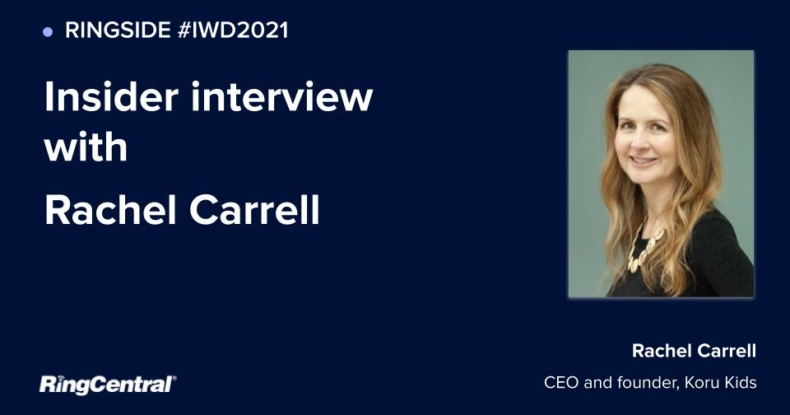As part of our support for International Women’s Day “Choose to Challenge”, we invited women in leadership to discuss their views on gender inequality and related issues. Besides hearing from some of our own female leaders, we also reached out to inspiring women from other businesses. For this #IWD2021 Ringside, we caught up with Rachel Carrell, the CEO and founder of Koru Kids, an innovative, London based childcare service.
Can you tell us a bit about yourself?
I’m originally from New Zealand and came over here on a Rhodes Scholarship to attend the University of Oxford, where I did a masters and a doctorate. I then spent a few years working in a corporate environment before I had my first child, I’ve got two children now, aged three and six.
How about Koru Kids? What does the company do, and what inspired you to set up the organisation?
We recruit, train, match and manage nannies and aim to solve the childcare sector’s problems. Our focus started with after school care because that was the most pressing need in the industry. We’ve now broadened out and offer lots of different kinds of in-home care.
During the pandemic, we’re doing plenty of home-schooling support. We also help with nursery pickup, looking after children after closed doors. When schools open again, we will of course, be doing after school pickup as well.
After I had my first baby, I realised how impossibly difficult it was to find really, really great childcare. This is what inspired me to found Koru Kids; to build a much better childcare infrastructure and solve the common problems in this sector.
We should consider childcare in the same way that we do our roads, the tube and water pipes. It is a fundamental infrastructure for our lives. Click To Tweet
What’s been the driving force to get you where you are today?
For me, the driving force is anger and annoyance that no one else has solved this problem in the childcare sector. I feel strongly that we should have better infrastructure – it’s so important. We should consider childcare in the same way that we do our roads, the tube and water pipes. It is a fundamental infrastructure for our lives. I don’t believe people think about childcare in this way. They don’t respect it as they do other essential services. It’s a challenging profession, and it can be lonely. It’s hard, but it’s hugely important.
I get energised by the need to make the industry better for the people who work in it. The people who use this essential service are mostly women, and for them, the problems in this sector are an issue. It is vital to ensure that we have enough female leadership and that women don’t quit their jobs when they don’t want to, just because they can’t find childcare that works for them.
When I had my first child and started hearing stories from my friends and experiencing these problems myself, I got motivated to work on this mission. My motivation has only increased because now I can see what difference we make in our families’ lives. I also see how we change their experience from one where everything feels out of control to the complete opposite. The parents feel like they’re overwhelmed, drowning, and don’t have the headspace to be the parents the way they want to be – and then we start helping them. Suddenly, their lives become so much more manageable. They get a sense of calm and control, and their family begins to flourish, and their children start to as well. It’s all incredibly rewarding.
Have you benefited from having any personal mentors?
I don’t have one person I say is my mentor. I think I have hundreds of mentors and regularly reach out to my peers and to people who are ahead of me in the journey. I’m continually asking for help to understand their experience and see what I can learn. I find the community of founders and people who work in startups in London incredibly supportive, and I absolutely could not have done this all without every single one of them. I always try and pay that forward and help other people who are coming through as well. It’s been hugely valuable to me, and it’s such a crucial part of being a leader.
So often, the reason that women either step back from the workplace or quit their jobs entirely is not that they want to, but because they can't find the childcare that works for their family. Click To Tweet
Are there any initiatives you think make a substantive difference in addressing the gender pay gap and open up opportunities for females to progress in their careers?
Yes, and not surprisingly, I think childcare is vital. So often, the reason that women either step back from the workplace or quit their jobs entirely is not that they want to, but because they can’t find the childcare that works for their family. I want us to be that fundamental infrastructure that allows female leaders to continue being leaders. Female leadership is imperative. Leadership in every part of our society should be diverse.
During the pandemic, we’ve seen some wonderful examples of female leadership worldwide, including in my home country, New Zealand. I get incredibly inspired by New Zealand’s Prime Minister, Jacinda. The qualities that she has brought with her are emblematic of what outstanding female leadership can be. We need much more great female leadership; childcare and making it affordable, accessible, and high quality is critical in allowing that to happen.
The lack of an affordable, good quality childcare service in this country is why we don't have more outstanding female leadership. Click To Tweet
Why do you think we still have so few female leaders?
Again, I don’t want to make everything about childcare, but I work on this issue because I believe it is integral. The lack of an affordable, good quality childcare service in this country is why we don’t have more outstanding female leadership. Even for people who don’t have children, obviously, lots of women don’t have children. But if you don’t have mothers in senior positions, then the policies created won’t necessarily be as progressive or helpful.
How has COVID-19 impacted your work life balance and responsibilities outside of work? Any words of wisdom you can share on how you’ve managed the past 12 months?
It has been challenging homeschooling and having to juggle that with my job. Luckily, as you would imagine, I do have wonderful in-home childcare. So, it’s no surprise that I’ve had excellent help. There’s no way I could have done it and kept going without it. That’s why I get up every morning; to try and give other people the support that I am lucky enough to have in my home.
I will say the other thing is my husband is hugely supportive. I’m a big believer in the saying that the most important career decision a woman will make is who her partner is. This is also my tip for any younger woman: think very carefully about who your partner will be. Ensure they are someone who will support you in your ambitions and in the work you want to do in life.
Originally published Mar 08, 2021

